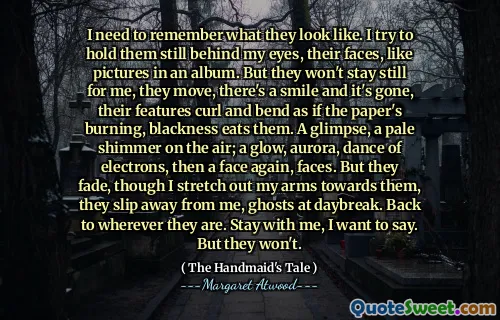There's time to spare. This is one of the things I wasn't prepared for - the amount of unfilled time, the long parentheses of nothing. Time as white sound.
In "The Handmaid's Tale" by Margaret Atwood, the protagonist grapples with an unexpected abundance of free time that weighs heavily on her. This unfilled time contrasts sharply with her previous life, highlighting moments of emptiness that feel disorienting. The realization of endless hours devoid of purpose creates a haunting atmosphere, reminiscent of white noise that envelops her experiences.
This exploration of time reveals the psychological impact of living in a controlled society, where routine and strict roles govern existence. It suggests that the absence of meaningful activity can be as oppressive as any physical restraint, offering a profound commentary on solitude and the human condition in a dystopian setting.






